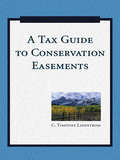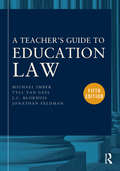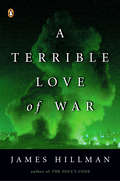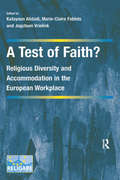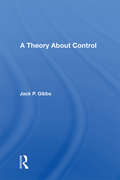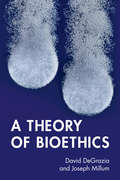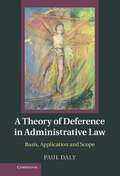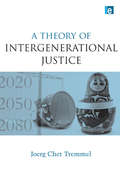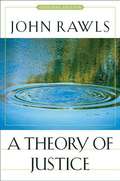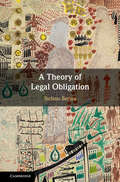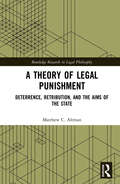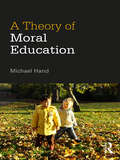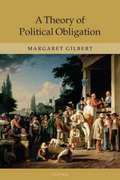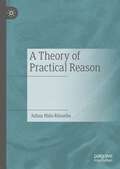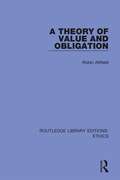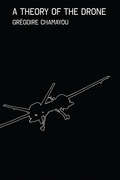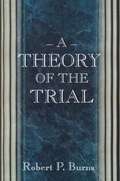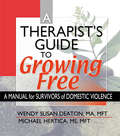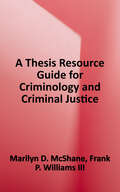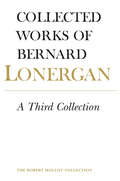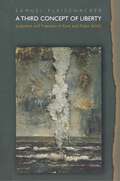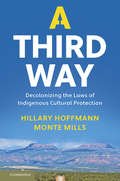- Table View
- List View
A Tax Guide to Conservation Easements
by C. Timothy LindstromVoluntary land conservation, resulting from increasingly alluring tax benefits, has significantly changed the face of land use in the United States and promises to have an even more significant influence in the future. There are more than 1,500 land trusts in the U.S. today, involving millions of acres of land that have been permanently protected by conservation easements. Most of these land trusts depend heavily upon the significant tax benefits offered by the federal tax code as an incentive for voluntary land conservation. However, only a very small percentage of land trust personnel, landowners, or even government officials fully understand the complexity of the requirements for these tax benefits. This is a comprehensive book on the tax benefits of the charitable contribution, or bargain sale, of a conservation easement. It provides a detailed explanation of the complex and extensive requirements of the federal tax code and related concepts, including the rules governing the operation of tax-exempt organizations such as land trusts. Clearly written, systematic in its coverage, it is intended to be of value for anyone who deals with land trust issues as well as interested lay people. Structured for easy reference, A Tax Guide to Conservation Easements is designed to be used as a resource tool. Related topics are cross-referenced throughout. All principles in the book are illustrated with one or more useful examples. The tax benefits of contributing a conservation easement are unquestionably the heart of voluntary land conservation today. Knowledge of the tax law relating to land trusts and conservation easements is vital to properly establishing and managing land trusts and to insuring the tax deductibility of conservation easements. The future of voluntary land conservation is dependent on a clear understanding of tax policy. Complete, meticulous, and up to date, A Tax Guide to Conservation Easementsis an essential handbook.
A Teacher's Guide to Education Law
by Tyll Van Geel Michael Imber Jonathan Feldman J. C. BlokhuisAdapted from its parent volume Education Law, 5th Edition, this accessible text concisely introduces topics in law that are most relevant to teachers. Providing public school teachers with the legal knowledge necessary to do their jobs, A Teacher’s Guide to Education Law covers issues of student rights, discipline, negligence, discrimination, special education, teacher rights, hiring and firing, contracts, unions, collective bargaining, and tenure. Special Features: This revised edition includes new content on bullying, privacy, discrimination, school finance, and issues relating to Internet and technology, as well as updated references and case law throughout. To aid comprehension, technical terms are carefully explained and summaries of key topics and principles are provided. Case law is presented within the context of real-world examples, making this text accessible to pre-service teachers who have little background in law. A companion website provides additional resources for students and instructors, such as links to full cases and a glossary of key concepts.
A Technomoral Politics: Good Governance, Transparency, and Corruption in India
by Aradhana SharmaExamining anticorruption battles and transparency laws to ask: what makes for good governance, and can it limit liberal democratic politics as much as encourage it? Good governance is meant to empower citizens, increase democratic participation, and make states transparent and accountable, yet this liberal democratic imperative can also promote populist authoritarian rule. Bringing together discourses on ethical goodness with the technicalities of governance as expressed in laws and policies, Aradhana Sharma develops the concept of &“technomoral politics&” to navigate this fraught topic. With a focus on the work of activists, citizens, and state officials, she offers an ethnographic account of the contradictions and dangers of good-governance politics in twenty-first-century India. A Technomoral Politics follows the evolution of a group of activists in New Delhi led by Arvind Kejriwal from 2008 to 2014 as they morphed from a protransparency NGO to a mass movement against state corruption to a populist party that promised to change the political system through laws and policies. Sharma explores the technomoral framing of state opacity and corruption as well as the limits of the law in resolving these issues, probing such themes as the contradictory relationship between transparency and bureaucracy and the classed and gendered nature of democratic state institutions. By examining scalar dimensions of good-governance politics, from the hyperlocal work of activists to global trends, A Technomoral Politics illuminates the paradoxes, limits, and risks of a system that is meant to spread liberal democratic principles but that also ends up promoting antidemocratic, populist-authoritarian forms of rule. Retail e-book files for this title are screen-reader friendly.
A Terrible Love of War
by James HillmanWar is a timeless force in the human imagination—and, indeed, in daily life. Engaged in the activity of destruction, its soldiers and its victims discover a paradoxical yet profound sense of existing, of being human. In A Terrible Love of War, James Hillman, one of today’s most respected psychologists, undertakes a groundbreaking examination of the essence of war, its psychological origins and inhuman behaviors. Utilizing reports from many fronts and times, letters from combatants, analyses by military authorities, classic myths, and writings from great thinkers, including Twain, Tolstoy, Kant, Arendt, Foucault, and Levinas, Hillman’s broad sweep and detailed research bring a fundamentally new understanding to humanity’s simultaneous attraction and aversion to war. This is a compelling, necessary book in a violent world.
A Test of Faith?: Religious Diversity and Accommodation in the European Workplace (Cultural Diversity and Law in Association with RELIGARE)
by Marie-Claire Foblets Katayoun Alidadi Jogchum VrielinkIssues of religious diversity in the workplace have become very topical and have been raised before domestic courts and the European Court of Human Rights. Examining the controversial and constantly evolving position of religion in the workplace, this collection brings together chapters by legal and social science scholars and provides a wealth of information on legal responses across Europe, Turkey and the United States to conflicts between professional and religious obligations involving employees and employers. The contributors examine how case law from the European Court of Human Rights, domestic experiences and comparative analyses can indicate trends and reveal established and innovative approaches. This multi-perspective volume will be relevant for legal practitioners, researchers, academics and policy-makers interested in human rights law, discrimination law, labour law and the intersection of law and religion.
A Theory About Control
by Jack P. GibbsMoving beyond his 1989 book, Control: Sociology's Central Notion, Jack Gibbs develops in this new book a comprehensive theory of control in all its biological, technological, and human dimensions. His treatment goes beyond conventional ideas about social control to show why self-control and proximate control are essential to understanding human interaction. He also argues that thinking of control in terms of the counteraction of deviance is insufficient. Tests of Gibbs's control theory, based on data from sixty-six countries, add credence to his claim that control could be the central notion for sociology and perhaps for other social sciences.
A Theory of Bioethics
by David DeGrazia Joseph MillumThis volume offers a carefully argued, compelling theory of bioethics while eliciting practical implications for a wide array of issues including medical assistance-in-dying, the right to health care, abortion, animal research, and the definition of death. The authors' dual-value theory features mid-level principles, a distinctive model of moral status, a subjective account of well-being, and a cosmopolitan view of global justice. In addition to ethical theory, the book investigates the nature of harm and autonomous action, personal identity theory, and the 'non-identity problem' associated with many procreative decisions. Readers new to particular topics will benefit from helpful introductions, specialists will appreciate in-depth theoretical explorations and a novel take on various practical issues, and all readers will benefit from the book's original synoptic vision of bioethics. This title is also available as Open Access on Cambridge Core.
A Theory of Deference in Administrative Law
by Paul DalyIn the modern administrative state, hundreds if not thousands of officials wield powers that can be used to the benefit or detriment of individuals and corporations. When the exercise of these powers is challenged, a great deal can be at stake. Courts are confronted with difficult questions about how to apply the general principles of administrative law in different contexts. Based on a comparative theoretical analysis of the allocation of authority between the organs of government, A Theory of Deference in Administrative Law provides courts with a methodology to apply no matter how complex the subject matter. The firm theoretical foundation of deference is fully exposed and a comprehensive doctrine of curial deference is developed for application by courts in judicial review of administrative action. A wide scope is urged, spanning the whole spectrum of government regulation, thereby ensuring wide access to public law remedies.
A Theory of Fairness and Social Welfare
by Marc Fleurbaey François ManiquetThe definition and measurement of social welfare have been a vexed issue for the past century. This book makes a constructive, easily applicable proposal and suggests how to evaluate the economic situation of a society in a way that gives priority to the worse-off and that respects each individual's preferences over his or her own consumption, work, leisure, and so on. This approach resonates with the current concern to go "beyond the GDP" in the measurement of social progress. Compared to technical studies in welfare economics, this book emphasizes constructive results rather than paradoxes and impossibilities, and shows how one can start from basic principles of efficiency and fairness and end up with concrete evaluations of policies. Compared to more philosophical treatments of social justice, this book is more precise about the definition of social welfare and reaches conclusions about concrete policies and institutions only after a rigorous derivation from clearly stated principles.
A Theory of Intergenerational Justice
by Joerg Chet TremmelThe appeal to 'our obligations to future generations' is one of the most forceful, emotional and effective arguments available to politicians and citizens and is the cornerstone of all modern policies aimed at sustainable development. Yet, the exact nature and extent of these obligations are unclear - who owes what to whom, exactly, and why? This highly accessible book provides an extensive and comprehensive overview of current research and theory about why and how we should protect future generations. It exposes how and why the interests of people today and those of future generations are often in conflict and what can be done. It rebuts critical concepts such as Parfits' 'non-identity' paradox and Beckerman's denial of any possibility of intergenerational justice. The core of the book is the lucid application of a 'veil of ignorance' to derive principles of intergenerational justice which show that our duties to posterity are stronger than is often supposed. Tremmel's approach demands that each generation both consider and improve the well-being of future generations. To measure the well-being of future generations Tremmel employs the Human Development Index rather than the metrics of utilitarian subjective happiness. The book thus answers in detailed, concrete terms the two most important questions of every theory of intergenerational justice: 'what to sustain' and 'how much to sustain?' Ultimately this book provides a theory of intergenerational justice that is both intellectually robust and practical with wide applicability to law, policy, economics, climate change and all other contexts that affect future generations.
A Theory of Justice (Original Edition)
by John RawlsThough the revised edition of A Theory of Justice, published in 1999, is the definitive statement of Rawls's view, so much of the extensive literature on Rawls's theory refers to the first edition. This reissue makes the first edition once again available for scholars and serious students of Rawls's work.
A Theory of Legal Obligation
by Stefano BerteaThe focus of this monograph lies in the construction of a theory of legal obligation, understanding it as a discrete notion with its own defining traits. In this work, Bertea specifically addresses the question: how should legal obligation be distinctively conceptualized? The conceptualization of legal obligation he defends in this work gradually emerges from a critical assessment of the theories of legal obligation that have been most influential in the contemporary legal-theoretical debate. Building on such critical analysis, Bertea's study purports to offer a novel and unconventional conceptualization of legal obligation, which is characterized as a law-engendered intersubjective reason for carrying out certain courses of conduct.
A Theory of Legal Punishment: Deterrence, Retribution, and the Aims of the State (Routledge Research in Legal Philosophy)
by Matthew C. AltmanThis book argues for a mixed theory of legal punishment that treats both crime reduction and retribution as important aims of the state. A central question in the philosophy of law is why the state’s punishment of its own citizens is justified. Traditionally, two theories of punishment have dominated the field: consequentialism and retributivism. According to consequentialism, punishment is justified when it maximizes positive outcomes. According to retributivism, criminals should be punished because they deserve it. This book recognizes the strength of both positions. According to the two-tiered model, the institution of punishment and statutory penalties, as set by the legislature, are justified based on their costs and benefits, in terms of deterrence and rehabilitation. The law exists to preserve the public order. Criminal courts, by contrast, determine who is punished and how much based on what offenders deserve. The courts express the community’s collective sense of resentment at being wronged. This book supports the two-tiered model by showing that it accords with our moral intuitions, commonly held (compatibilist) theories of freedom, and assumptions about how the extent of our knowledge affects our obligations. It engages classic and contemporary work in the philosophy of law and explains the theory’s advantages over competing approaches from retributivists and other mixed theorists. The book also defends consequentialism against a longstanding objection that the social sciences give us little guidance regarding which policies to adopt. Drawing on recent criminological research, the two-tiered model can help us to address some of our most pressing social issues, including the death penalty, drug policy, and mass incarceration. This book will be of interest to philosophers, legal scholars, policymakers, and social scientists, especially criminologists, economists, and political scientists.
A Theory of Mediators’ Ethics
by Shapira OmerMany aspects relating to the conduct of mediation are left to mediator choice, but mediators often lack adequate guidance on how their discretion ought to be exercised. In this book, Omer Shapira identifies the ethical norms that govern mediators' conduct. Adopting a professional ethics perspective on the basis of role-morality and applying it to a core definition of mediators' role, Shapira argues that all mediators are placed in ethical relationships with mediation parties, the mediation profession, the public and their employers. or principals that produce ethical obligations. The book goes on to explore the legitimate expectations of these groups and analyzes existing codes of conduct for mediators. Shapira constructs a theory of mediators' ethics that produces a proposed model code of conduct for mediators - a detailed set of norms of mediators' ethics that can be rationally justified and defended with regard to mediators at large.
A Theory of Moral Education
by Michael HandChildren must be taught morality. They must be taught to recognise the authority of moral standards and to understand what makes them authoritative. But there’s a problem: the content and justification of morality are matters of reasonable disagreement among reasonable people. This makes it hard to see how educators can secure children’s commitment to moral standards without indoctrinating them. In A Theory of Moral Education, Michael Hand tackles this problem head on. He sets out to show that moral education can and should be fully rational. It is true that many moral standards and justificatory theories are controversial, and educators have an obligation to teach these nondirectively, with the aim of enabling children to form their own considered views. But reasonable moral disagreement does not go all the way down: some basic moral standards are robustly justified, and these should be taught directively, with the aim of bringing children to recognise and understand their authority. This is an original and important contribution to the philosophy of moral education, which lays a new theoretical foundation for the urgent practical task of teaching right from wrong.
A Theory of Political Obligation: Membership, Commitment, and the Bonds of Society
by Margaret GilbertMargaret Gilbert offers an incisive new approach to a classic problem of political philosophy: when and why should I do what the laws of my country tell me to do? Beginning with carefully argued accounts of social groups in general and political societies in particular, the author argues that in central, standard senses of the relevant terms membership in a political society in and of itself obligates one to support that society's political institutions. The obligations in question are not moral requirements derived from general moral principles, as is often supposed, but a matter of one's participation in a special kind of commitment: joint commitment. An agreement is sufficient but not necessary to generate such a commitment. Gilbert uses the phrase 'plural subject' to refer to all of those who are jointly committed in some way. She therefore labels the theory offered in this book the plural subject theory of political obligation. The author concentrates on the exposition of this theory, carefully explaining how and in what sense joint commitments obligate. She also explores a classic theory of political obligation --- actual contract theory --- according to which one is obligated to conform to the laws of one's country because one agreed to do so. She offers a new interpretation of this theory in light of a theory of plural subject theory of agreements. She argues that actual contract theory has more merit than has been thought, though the more general plural subject theory is to be preferred. She compares and contrasts plural subject theory with identification theory, relationship theory, and the theory of fair play. She brings it to bear on some classic situations of crisis, and, in the concluding chapter, suggests a number of avenues for related empirical and moral inquiry. Clearly and compellingly written, A Theory of Political Obligation will be essential reading for political philosophers and theorists.
A Theory of Practical Reason
by Julian Nida-RümelinIn this book, German philosopher Julian Nida-Rümelin presents a theory of practical reason that is objectivist, or rather realist, as an alternative to the widespread subjectivism in the theory of rationality. This theory has pragmatic traits that can be read as a constructive counterpart to Nida-Rümelin's critique of consequentialism whilst embedding its conception of rationality in the conceptual framework of decision and game theory.
A Theory of Value and Obligation
by Robin AttfieldOriginally published in 1987 and re-issued in 2020 with a new Preface, this book presents and elaborates interrelated solutions to a number of problems in moral philosophy, from the location of intrinsic value and the nature of a worthwhile life, via the limits of obligation and the nature of justice, to the status of moral utterances. After developing a biocentric account of moral standing, the author locates worthwhile life in the development of the generic capacities of a creature, whether human or nonhuman, and presents an account of relative intrinsic value which later generates a theory of interspecific justice. This value-theory also informs a consequentialist understanding of obligation, of moral rightness and of supererogation. The understanding thus supplied is shown to cope with the problems of integrity, of justice and of the ‘Repugnant Conclusion’ in population ethics. A cognitivist account of ethical conclusions such as those so far reached is then defended against non-cognitivist and relativist objections and a far-reaching naturalist theory is defended, integrating earlier conclusions with an account of the logic of the fundamental ethical concepts. This wide-ranging volume which maps the whole area of morality is thoroughly argued with reference both to contemporary philosophical developments and to classical theories.
A Theory of the Drone
by Grégoire ChamayouDrone warfare has raised profound ethical and constitutional questions both in the halls of Congress and among the U.S. public. Not since debates over nuclear warfare has American military strategy been the subject of discussion in living rooms, classrooms, and houses of worship. Yet as this groundbreaking new work shows, the full implications of drones have barely been addressed in the recent media storm.In a unique take on a subject that has grabbed headlines and is consuming billions of taxpayer dollars each year, philosopher Grégoire Chamayou applies the lens of philosophy to our understanding of how drones are changing our world. For the first time in history, a state has claimed the right to wage war across a mobile battlefield that potentially spans the globe. Remote-control flying weapons, he argues, take us well beyond even George W. Bush's justification for the war on terror.What we are seeing is a fundamental transformation of the laws of war that have defined military conflict as between combatants. As more and more drones are launched into battle, war now has the potential to transform into a realm of secretive, targeted assassinations of individuals--beyond the view and control not only of potential enemies but also of citizens of democracies themselves. Far more than a simple technology, Chamayou shows, drones are profoundly influencing what it means for a democracy to wage war. A Theory of the Drone will be essential reading for all who care about this important question.
A Theory of the Trial
by Robert P. BurnsAnyone who has sat on a jury or followed a high-profile trial on television usually comes to the realization that a trial, particularly a criminal trial, is really a performance. Verdicts seem determined as much by which lawyer can best connect with the hearts and minds of the jurors as by what the evidence might suggest. In this celebration of the American trial as a great cultural achievement, Robert Burns, a trial lawyer and a trained philosopher, explores how these legal proceedings bring about justice. The trial, he reminds us, is not confined to the impartial application of legal rules to factual findings. Burns depicts the trial as an institution employing its own language and styles of performance that elevate the understanding of decision-makers, bringing them in contact with moral sources beyond the limits of law. Burns explores the rich narrative structure of the trial, beginning with the lawyers' opening statements, which establish opposing moral frameworks in which to interpret the evidence. In the succession of witnesses, stories compete and are held in tension. At some point during the performance, a sense of the right thing to do arises among the jurors. How this happens is at the core of Burns's investigation, which draws on careful descriptions of what trial lawyers do, the rules governing their actions, interpretations of actual trial material, social science findings, and a broad philosophical and political appreciation of the trial as a unique vehicle of American self-government.
A Therapist's Guide to Growing Free: A Manual for Survivors of Domestic Violence
by Michael Hertica Wendy Susan DeatonHelp victims and survivors break the cycle of abuse!Trying to get victims and survivors of domestic abuse to recognize their own victimization can be a frustrating experience. They often become so frightened, isolated, and self-doubting that they make excuses for the abuser. Combining psychological insight with practical safety information, this book helps therapists guide their clients into understanding--and ending--the vicious cycle of wooing, tension, violence, and remorse. A Therapist's Guide to Growing Free provides a comprehensive outline of the issues, tasks, and goals involved in the treatment of victims and survivors. Its chapter-by-chapter breakdown of how violent relationships function and how to end them safely can help you guide a traumatized woman through her therapeutic journey.The guide's companion volume, Growing Free: A Manual for Survivors of Domestic Violence is the perfect handout for clients in individual therapy, group therapy, and battered women's shelters. Reading stories like their own may provide the shock of recognition they need to be able to understand--and eventually to end--the cycle of violence that characterizes all levels of domestic abuse. It outlines a series of steps they can take to ensure their emotional and physical safety. Its stories of women in abusive relationships and discussions of the cycle of abuse are direct and easy to read without ever being condescending.A Therapist's Guide to Growing Free provides the insight and therapeutic models needed for effective intervention and treatment, including: psychological effects and belief systems of victims and survivors discussions and illustrations of the cycle of violence the effects of domestic violence on children and adolescents the therapeutic challenges of couple/conjoint therapy handling crisis intervention suggestions for conducting group and therapeutic therapy for victim and battererA Therapist's Guide to Growing Free and its companion volume provide both therapists and clients with a practical, action-oriented approach to the problem of domestic violence. It is ideal training and reference material for counselors at women's shelters, emergency room personnel, law-enforcement officers, and other professionals involved in the rescue, support, defense, and treatment of victims and survivors.
A Thesis Resource Guide for Criminology and Criminal Justice
by Frank P. Williams III Marilyn D. McShaneThis handbook is a comprehensive guide to developing and writing graduate level research. It takes the reader on a step-by-step journey through the entire thesis process from initial ideas to a completed product or even a published article. Examples from actual student theses provide concrete illustrations of each step and function as a starting point for one's own project. Tips for organizing tasks and completing them on time help orient readers to the research process and give them confidence to achieve their own research goals. Unique step-by-step guide for successfully completing the thesis projectfrom development through defense. Examples from theses done by students provide concrete illustrations and a starting point for ideas and discussion. Broad range of quantitative and qualitative thesis methodologies gives readers an overview of the basic tools of the research process. Tips for organizing tasks and completing the project on time. Those looking for assistance with writing a thesis.
A Third Collection: Volume 16
by John Dadosky Bernard Lonergan Robert Doran, S.J. Lonergan Research InstituteA Third Collection, prepared for the Collected Works of Bernard Lonergan by editors Robert M. Doran and John D. Dadosky, is a helpful companion to volumes four and thirteen in the series. The volume contains fifteen papers, written between 1974 and 1982, and includes some of his most important shorter writings such as "Prolegomena to the Study of the Emerging Religious Consciousness of Our Time" and "Natural Right and Historical Mindedness." The relevant archival entries are specified, so that readers can consult them. The papers in this volume rehearse in a new key the themes of a lifetime. Without in any way going back on the major emphases of Lonergan's early work–cognitional theory and then the exploration of a fourth, existential level of consciousness– they are focused more on love and on the movement from above downwards in consciousness. Community is emphasized as the context and the fruit of the emergence of authentic subjects.
A Third Concept of Liberty: Judgment and Freedom in Kant and Adam Smith
by Samuel FleischackerTaking the title of his book from Isaiah Berlin's famous essay distinguishing a negative concept of liberty connoting lack of interference by others from a positive concept involving participation in the political realm, Samuel Fleischacker explores a third definition of liberty that lies between the first two. In Fleischacker's view, Kant and Adam Smith think of liberty as a matter of acting on our capacity for judgment, thereby differing both from those who tie it to the satisfaction of our desires and those who translate it as action in accordance with reason or "will." Integrating the thought of Kant and Smith, and developing his own stand through readings of the Critique of Judgment and The Wealth of Nations, Fleischacker shows how different acting on one's best judgment is from acting on one's desires--how, in particular, good judgment, as opposed to mere desire, can flourish only in favorable social and political conditions. At the same time, exercising judgment is something every individual must do for him- or herself, hence not something that philosophers and politicians who reason better than the rest of us can do in our stead. For this reason advocates of a liberty based on judgment are likely to be more concerned than are libertarians to make sure that government provides people with conditions for the use of their liberty--for example, excellent standards of education, health care, and unemployment insurance--while at the same time promoting a less paternalistic view of government than most of the movements associated for the past thirty years with the political left.
A Third Way: Decolonizing the Laws of Indigenous Cultural Protection
by Hillary M. Hoffmann Monte MillsIn A Third Way, Hillary Hoffmann and Monte Mills detail the history, context, and future of the ongoing legal fight to protect indigenous cultures. At the federal level, this fight is shaped by the assumptions that led to current federal cultural protection laws, which many tribes and their allies are now reframing to better meet their cultural and sovereign priorities. At the state level, centuries of antipathy toward tribes are beginning to give way to collaborative and cooperative efforts that better reflect indigenous interests. Most critically, tribes themselves are building laws and legal structures that reflect and invigorate their own cultural values. Taken together, and evidenced by the recent worldwide support for indigenous cultural movements, events of the last decade signal a new era for indigenous cultural protection. This important work should be read by anyone interested in the legal reforms that will guide progress toward that future.
